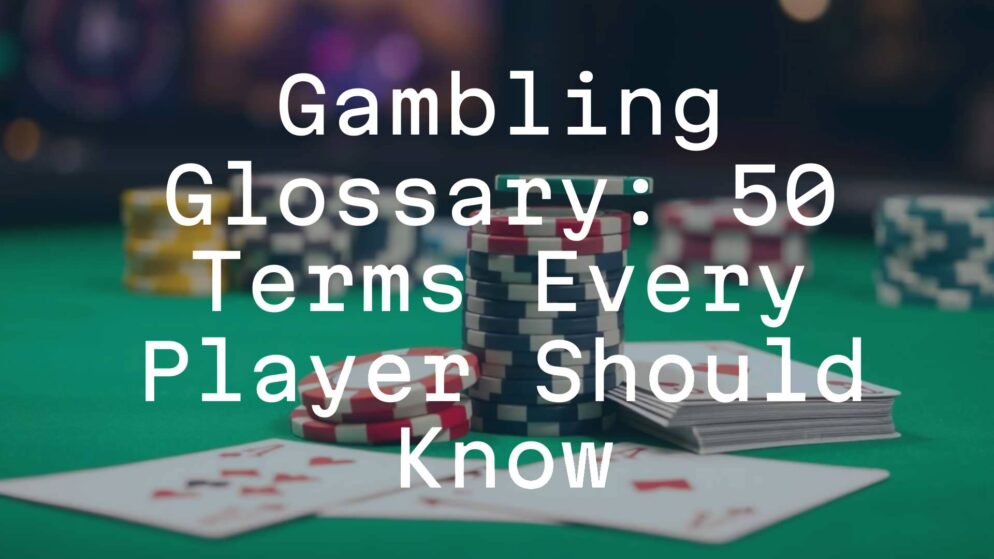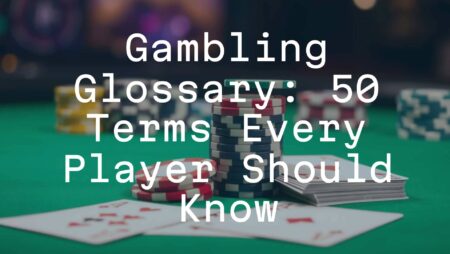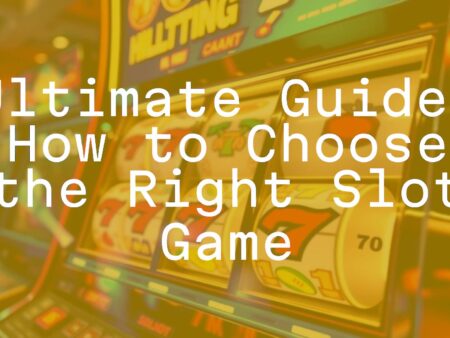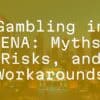

Gambling is full of terms and sayings that cover different types of bets, player roles, and ways of playing. A gambling glossary is a list of these words with clear meanings. Knowing these terms is important, as it helps you understand the rules, make smarter bets, and avoid making mistakes. If you don’t know the common lingo, betting can feel as confusing as playing cards without any pictures or numbers.
Whether you’re just starting out at a casino, watching races, or betting online, the vocabulary can seem strange at first. Use this glossary to turn confusing jargon into words you can understand and use. By learning what things like “moneyline” or “bad beat” mean, you’ll be able to play, talk about betting, and make decisions with much more confidence and skill.

What Is a Gambling Glossary and Why Is It Important?
A gambling glossary isn’t just a list of random words – it’s a simple guide for anyone who bets, from beginners to experienced gamblers. It explains the usual words and phrases you’ll hear in casinos or betting sites. Many of the words have developed over years as gambling has changed and grown.
This glossary is important because it helps everyone use and understand the same words. Without it, talking about bets would be confusing. It makes things clear, so you know the exact kind of bet you’re making and what might happen. This shared language also lets people follow betting guides and advice with confidence.
How Does Knowing Gambling Terms Help You Play Better?
Knowing gambling terms helps you play better because it lets you think more clearly and make smarter choices. If you try to play without learning what the words mean, you’re much more likely to make mistakes. Many terms describe special types of bets or rules. For example, a “parlay” means you must get all your picks right to win, which is harder, but pays more. A “teaser” lets you change the odds to suit you but lowers the possible payout. Understanding these differences lets you match your bets to the way you want to play. Other words, like “edge” or “value bet,” show you ways to spot good opportunities, which can make your long-term results better.
Why Beginners and Experts Should Use a Gambling Glossary
Both new and experienced bettors can get a lot from a gambling glossary. If you’re just starting, it helps you learn the basics and avoid simple mistakes. You’ll quickly learn about basic bets, what “odds” mean, and how to understand payouts. For experienced bettors, the glossary is handy when you come across a term you don’t use often or when you’re trying new betting strategies. As gambling grows and changes, new words and terms show up-especially online. A glossary helps you keep up, so you don’t miss new types of bets or misunderstand what’s offered. Having clear definitions is key, especially if you use tricky tactics like “hedging,” where you mix bets to manage your risk.

Key Types of Gambling Terms Explained
Gambling covers many different games and bet types, each with its own set of terms. Grouping these words by game types helps you learn faster.
Sports Betting Terms
Sports betting includes words for betting on games and matches. For example:
- Point Spread: A way to even out betting by giving one team a points advantage or disadvantage. Betting on the favorite means they have to win by more than this spread.
- Moneyline: A bet on which team or player will win, no matter the score difference. Odds show how much you win.
- Over/Under (Total): Betting if the combined score will be higher or lower than a number set by the bookmaker.
- Parlay: A bet on more than one game or outcome. You only win if all your picks are correct.
- Futures: Bets on something happening later on, like picking who will win a championship before the season begins.
- Live Betting: Placing bets on a game as it’s happening in real time.
Casino Game Terms
Casino games have special words, too. Some examples:
- House Edge: The casino’s built-in advantage over players in any game.
- Payout: The money you get if you win a bet, based on the odds and your stake.
- Bluff: In poker, making others think you have a stronger hand than you do by betting big.
- Flop, River: Cards placed on the table in games like Texas Hold’em poker.
- Jackpot: A large payout, often for hitting a specific combination in slots or table games.
- RTP (Return to Player): The percentage of money that a slot machine is expected to return to players over time.
Horse Racing Terms
Horse racing uses its own language for placing bets and talking about the races:
- Across the Board: A bet that covers a horse to win, place (second), or show (third).
- Ante-post: A bet made before the final list of runners is confirmed, with higher risk and higher possible payout.
- Each-way: A split bet for a horse to win or finish within a set number of places.
- Post Time: The scheduled start time for a race.
- Quinella: Pick two horses to finish first and second, in any order.
- Going: The condition of the racetrack, like “soft going.”
Poker and Table Game Words
Poker, blackjack, and roulette each use certain words for plays and bets:
- Call, Raise, Check: Poker actions to match, increase, or pass in betting rounds.
- All-in: Betting everything you have in poker.
- Pot: The total money bet in a hand.
- Hit, Stand: Asking for another card in blackjack, or keeping your current hand.
- Double Down: In blackjack, doubling your bet for one more card.
- Inside/Outside Bets: Different types of bets in roulette with different odds.
Online Gambling and New Terms
Online betting has new words that aren’t in traditional gambling:
- Site Credit: Extra betting funds offered by a site, often with special rules before you can cash out.
- Free Bet: A risk-free bet where you only win the profit, not the original amount given as the free bet.
- Bonus Voucher: A split between cash and bonus funds, with special payout rules.
- In-Game Wagering/Live Betting: Placing bets as action unfolds, with odds changing in real time.
- Arbitrage Betting: Placing bets on all outcomes of an event at different sites to guarantee a profit due to odds differences.
- Virtual Sports: Betting on computer-generated matches with results decided by chance, available at any time.

Gambling Glossary A-Z: 50 Key Terms to Know
Here is a collection of 50 core gambling words and their meanings, arranged alphabetically. These will help you feel comfortable reading, talking, and thinking about betting.
A-F: Accumulator to Futures Bet
- Accumulator (Parlay):
- A single bet that combines several selections. Every selection must win for the bet to succeed. Known as a parlay in the US.
- Action:
- A bet placed on an event. Used to describe the amount of betting on a game.
- Against the Spread (ATS):
- Betting on a team with the point spread, not just on them to win or lose.
- Alternate Line:
- An option to bet on a different point spread or total than the main choice, with adjusted odds.
- Arbitrage (Arbing):
- Betting all possible outcomes across different books to lock in a small, certain profit.
- Asian Handicap:
- A soccer bet where one team starts with a virtual lead to remove the chance of a draw.
- Backdoor Cover:
- When points scored at the end of a game change who wins or loses against the spread.
- Bad Beat:
- Losing a bet in an unlikely way, often when you seemed sure to win.
- Bankroll:
- The set amount of money you use only for betting.
- Beard (Runner):
- Someone making bets for another person to hide the real bettor’s identity.
- Book (Sportsbook):
- Company, website, or person that takes bets and sets odds.
- Buying Points:
- Paying extra (lowering the payout) to move a point spread to your advantage.
- Cash Out:
- Settling a bet before the event ends, getting part of the winnings or limiting losses.
- Chalk:
- The favorite in a game, with low odds. Betting “the chalk” means picking the favorite.
- Circled Game:
- A game where the bookmaker lowers betting limits because of unknowns, like injuries or weather.
- Closing Line:
- The final odds or spread when betting closes, just before a game starts.
- Closing Line Value (CLV):
- The difference between the odds when you bet and the final odds, showing how good your timing was.
- Consensus Pick:
- The side that most people are betting on, shown in betting stats.
- Cover:
- Winning a bet against the point spread, either as the favorite or underdog.
- Dime:
- Slang for a $1,000 bet.
- Dime Line:
- A small difference (10 cents) between the favorite’s and underdog’s odds, giving bettors better value.
- Dog (Underdog):
- The team/player not favored to win, usually with higher odds.
- Dollar:
- Slang for a $100 bet.
- Drift:
- When odds move higher because not enough people are betting on that outcome.
- Edge:
- An advantage you believe you have over the bookmaker, usually from research.
- Even Money:
- Odds that pay you the same amount as you bet (for example, bet $100 to win $100).
- Exotic Bet:
- Anything other than a simple straight bet. This includes parlays, teasers, and props.
- Expected Value (EV):
- A calculation of what you might win or lose on average with a bet.
- Fade:
- To bet against someone or something, like “fading” the public’s choice.
- Favorite:
- The team or player expected to win, shown with a minus (-) on the odds.
- Field:
- All the players or teams not listed separately in a market, usually considered outsiders.
- Fixed Odds:
- Your payout is set when you place your bet, no matter how odds move afterward.
- Futures Bet:
- A bet on something that’s decided later, like who will win a league or tournament.

G-L: Grand Salami to Lock
- Grand Salami:
- Betting on the total number of points/runs/goals scored in all games in a league during one day.
- Handicapper:
- Someone who studies games and predicts outcomes, often sharing advice.
- Handle:
- The full amount of money wagered on something at a sportsbook, before payouts.
- Hedge:
- Making a second bet to balance or reduce risk from a first bet, sometimes guaranteeing a profit.
- High Roller (Whale):
- A person who regularly bets large sums of money.
- Hook:
- A half-point added to a spread or total to avoid a tie (push).
- If Bet:
- A bet that depends on winning the one before it; the next bet is only placed if the first is successful.
- Implied Probability:
- Odds expressed as a percentage, showing what the bookmaker thinks the chance of winning is.
- In-Play Betting (Live Betting):
- Betting on events as they are happening, with odds updating live.
- Juice (Vig/Vigorish):
- The fee a bookmaker charges for taking your bet, usually built into the odds.
- Kelly Criterion:
- A formula for deciding how much of your bankroll to bet, based on your edge.
- Key Numbers:
- Scores or margins that happen often in certain sports and matter for spread betting.
- Line:
- The odds or point spread for a game or bet.
- Limit:
- The most a bookmaker will allow you to bet on a certain event.
- Lock:
- A term gamblers use for a bet they believe can’t lose (although nothing is truly guaranteed).
M-R: Martingale System to Round Robin
- Martingale System:
- Betting strategy where you double your bet after each loss, aiming to recover previous losses with one win.
- Middle:
- When you take both sides of a bet at different lines, hoping the result lands between them so both bets win.
- Moneyline:
- Simple bet on which side will win, without using point spreads.
- Mush:
- Nickname for a bettor who is considered unlucky, often going on losing streaks.
- Nickel:
- Slang for a $500 bet.
- No Action:
- A bet that gets canceled and your money is returned, usually because something changed in the event.
- Novelty Bet (Prop Bet):
- A special bet, often on unusual things like the coin toss or entertainment events.
- Odds:
- The numbers that show how much you win on a bet and how likely something is to happen.
- Odds-on Favorite:
- A favorite where you win less than you bet if they succeed, because their win is so likely.
- Off the Board (OTB):
- When a bet is removed and can’t be placed, often due to last-minute changes.
- Opening Line:
- The very first odds posted for an event.
- Outright Bet:
- A bet on the overall winner of a league or tournament, not a single game.
- Over/Under (Total):
- A bet on whether the total score will be above or below a given number.
- Parlay:
- A multi-step bet linking several picks together. All must win for the parlay to succeed.
- Payout:
- The total you receive if you win, including your original wager and your winnings.
- Pick ‘Em (PK):
- A game without a favorite or underdog – you just choose which side you think will win.
- Pleaser:
- A parlay where you adjust spreads against yourself for bigger potential winnings. It’s difficult to win.
- Point Spread:
- The number of points the favorite must win by, or the underdog must stay inside, for a bet to win.
- Prop Bet (Proposition Bet):
- A bet on a specific event or outcome within a game, not just the final score.
- Puck Line:
- In hockey, the standard spread bet – usually 1.5 goals.
- Push:
- A tie, where the final score lands exactly on the spread or total, so the bet is refunded.
- Quarter Bet:
- A bet on what will happen in a single quarter of a game.
- Quinella:
- Horse bet where your two picks must finish first and second in any order.
- Reverse Bet:
- Two if-bets where you bet both ways on the outcomes, to reduce risk.
- Reverse Line Movement (RLM):
- When the betting line moves opposite the way most bets are coming in, often due to expert money.
- Return on Investment (ROI):
- Your winnings compared to the amount you risked, shown as a percentage.
- Round Robin:
- Multiple smaller parlays from a group of picks, so you can still win even if one result loses.
S-Z: Run Line to Zigzag Theory
- Run Line:
- Like a point spread in baseball, usually set at 1.5 runs.
- Sharp (Wiseguy):
- Someone with deep knowledge and skill, often a professional, whose betting can move odds.
- Square (Public):
- A casual bettor who often bets on popular sides without deep analysis.
- Steam (Steam Move):
- Quick, strong movement of a betting line, often from big or professional bets placed at the same time.
- Straight Bet:
- A simple single bet, not linked with any others.
- Sucker Bet:
- Looks appealing but has much worse odds than you realize, making it hard to win.
- Syndicate:
- A team of people who combine money and skills for betting as a group.
- Teaser:
- A parlay where you move the line in your favor, for smaller winnings if you’re right on all games.
- Ticket:
- Your printed or digital proof of a placed bet.
- Tipster (Tout):
- Someone who gives or sells betting advice or picks.
- Total:
- Same as the over/under – the combined score to bet above or below.
- Underdog (Dog):
- The unfavored team, who will win you more if they succeed.
- Unit:
- The standard bet amount you use, usually a small part of your whole bankroll for consistency.
- Value Bet:
- A bet where you think the odds are better than the real chance of winning, giving you more return than expected.
- Variance:
- The ups and downs you can have in gambling, caused by luck or chance, even when playing smartly.
- Vigorish (Vig):
- Another term for the bookmaker’s fee or cut from your bet.
- Virtual Sports:
- Computer-run sporting events you can bet on, set up to mimic real games.
- Void Bet:
- A canceled bet where your stake is refunded.
- Wager:
- Another word for a bet.
- Welch:
- Not paying a bet that you lost or refusing to settle, which is seen as very dishonest.
- Yield:
- How much you won or lost as a percentage of everything you’ve bet over time.
- Zigzag Theory:
- Strategy where you bet on a team to bounce back after a loss, mainly used for playoff series in basketball and hockey.
Frequently Mixed-Up Gambling Terms and How to Tell Them Apart
Some gambling words sound similar or are often confused. Here are the differences to help you avoid mix-ups.
Accumulator vs Parlay
These words mean the same thing. Both mean combining several bets into one, and you only win if every pick is correct. “Accumulator” is used more in the UK and Europe, while “parlay” is the US term.
Odds, Payout, and Stake: What’s the Difference?
| Term | What It Means |
|---|---|
| Stake | The money you risk on a bet. |
| Odds | Show your possible winnings and the chances of your bet winning. |
| Payout | The total amount you get if your bet wins (your stake plus the winnings). |
Favorite vs Underdog
- Favorite: The expected winner. Odds are shown with a minus (-) sign; you get a smaller payout because they are more likely to win.
- Underdog: The expected loser. Odds have a plus (+) sign; they pay out more if they win since their chance is lower.

How to Use the Gambling Glossary to Make Smarter Bets
Keep this glossary handy whenever you bet. Before placing any bet, check the meaning of any word you’re not sure about. This helps you avoid mistakes like mixing up bet types or missing important conditions. Understanding exactly what you’re betting on helps you manage your risk and keeps your betting clear and accurate.
Avoiding Mistakes When Placing Bets
Reading a glossary before betting helps you know exactly what you’re agreeing to. For example, knowing that all legs in a parlay have to win avoids surprises. And understanding the difference between a moneyline and a point spread bet stops you from picking the wrong one by accident.
Talking with Bookmakers and Other Bettors
Knowing gambling terms makes conversations easier. When you use the right words, you get clear answers and questions are less likely to be misunderstood. It also lets you chat, ask for advice, or join in betting forums with other players without feeling lost.
Why Gambling Terms Change Over Time
The words people use in gambling change because of technology and new styles of betting. Online gambling has added new terms (like “live betting” and “cash out”) as new features are added. As new types of games and betting become popular, more words are created and added to glossaries, so it’s smart to check for new meanings every so often.
Technology’s Role
The growth of online betting has created new words and changed how people bet. Terms like “in-play betting,” “bonus codes,” and “” only exist because online platforms now make these offers and features possible.
New Trends
As new games like daily fantasy sports, esports, or new strategies become popular, new terms show up. For example, daily fantasy sports has its own way of talking about bets. As bettors get more creative, the language grows as well.

Common Questions about Gambling Terms
Which gambling term matters most for my strategy?
Odds have the biggest effect on your betting strategy. They set your potential win and show the chance of something happening. Learning how to read odds-and spot when they are better than they should be (a value bet)-helps you make good decisions.
Do I have to memorize all 50 terms before I bet?
No, you don’t need to remember every word at first. Start with the basics and main bet types for the games you play. Use the glossary as a tool to look up words as they come up. Over time, you’ll learn more naturally.
Where can I check new gambling slang or phrases?
- Betting Websites: Most major sportsbooks have their own glossaries and guides.
- Online Forums: Reddit and other betting forums are good for asking questions about new words.
- Social Media: Platforms like X (Twitter) often have updates and explanations of new slang.
- Specialist Sites: For games like poker or esports, visit websites focused on those areas for detailed explanations.
Some slang is short-lived, but when a term becomes widely used, you’ll soon find it in online glossaries. Stay curious and look up new words to quickly keep up with changes in gambling language.








